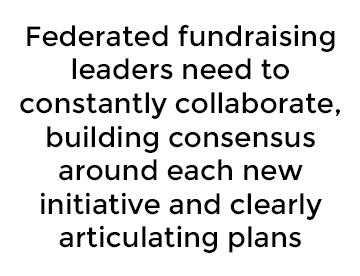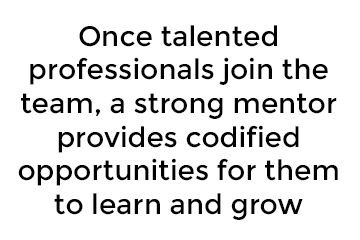

At the headquarters of federated organizations, fundraising executives wear many hats—but which are most critical to program success? The Campbell & Company Executive Search team has helped place many development leaders at institutions with complex national or international structures, and we understand what it takes to succeed.
Based on our experience and Campbell & Company’s original research on federated fundraising, we put together a list of the top four characteristics needed to thrive and grow in these roles.
Strategic Communicator
As the head of development for a geographically diverse organization, federated fundraising leaders must be comfortable speaking with a variety of stakeholders and overseeing all donor communications. The latter means striking a balance between national and local communications: understanding how often donors hear from each office, working to eliminate crossover appeals, and keeping messaging consistent.
A savvy leader will routinely analyze these factors from the donor’s perspective. This helps to guarantee that no matter where a supporter lives, they receive complementary, well-timed communications that share relevant information and clearly explain gift impact. Leaders can improve the donor communication experience by instructing their national team to write sample appeals for local chapters, providing a messaging framework and leaving space for customization.
Skilled Collaborator

Internally, federated fundraising leaders should cultivate close partnerships with board members and the rest of the senior leadership team, including the CEO, CMO, and CFO. While this is imperative for all heads of development, it’s vitally important at an organization with so many locations and priorities. The most effective leaders have a keen understanding of marketing, a strong financial acumen, and the ability to convey revenue projections.
Supporter-in-Chief
Heading development for a multi-chapter organization is just as much about support as it is about leadership. When the leader actively supports all fundraising staff—especially local teams—trust is stronger and territorialism is less of an issue. Whether the national office is set up to facilitate major and planned giving at the local level or designed to bring in significant revenue, fundraising leaders need to make sure policies are clear. They should also consider convening a cross-functional team of national and chapter staff to improve policies and crediting protocols.
Aside from clear fundraising policies, the best supporters recognize and listen to local teams in a variety of other ways. Many appoint chapter liaisons or relations managers to give local staff one point of contact. This manager can also spearhead outreach efforts, promote resources from the national office, and connect staff to their counterparts in other chapters.
Effective supporters also provide regular progress reports from the national office and create a space for chapter staff to ask questions, whether through conference calls, webinars, in-person visits, or online message boards. If development conferences aren’t part of the yearly calendar already, fundraising leaders should consider organizing such an event to bring together local and national staff and facilitate informal connections.
Team Mentor

In the case of development leaders at multi-chapter organizations, those other responsibilities include focusing on the career development of all fundraising staff—at the national office and at local chapters. Once talented professionals join the team, a strong mentor provides codified opportunities for them to learn and grow, from laying out a career ladder to offering training and professional development.
Leading the development operations of a multi-chapter organization is an intricate undertaking. By focusing on communication, collaboration, support, and mentorship, federated fundraising leaders can navigate their day-to-day and achieve their long-term goals.